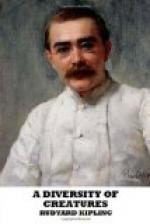‘Now for breakfast!’ she cried. ’My maid—Nurse Blaber—has the basket and things. It’ll be ready in twenty minutes. Oh! Look at my hair!’ and she went out laughing.
Conroy’s first discovery, made without fumbling or counting letters on taps, was that the London and South Western’s allowance of washing-water is inadequate. He used every drop, rioting in the cold tingle on neck and arms. To shave in a moving train balked him, but the next halt gave him a chance, which, to his own surprise, he took. As he stared at himself in the mirror he smiled and nodded. There were points about this person with the clear, if sunken, eye and the almost uncompressed mouth. But when he bore his bag back to his compartment, the weight of it on a limp arm humbled that new pride.
‘My friend,’ he said, half aloud, ‘you go into training. You’re putty.’
She met him in the spare compartment, where her maid had laid breakfast.
‘By Jove!’ he said, halting at the doorway, ’I hadn’t realised how beautiful you were!’
‘The same to you, lad. Sit down. I could eat a horse.’
‘I shouldn’t,’ said the maid quietly. ‘The less you eat the better.’ She was a small, freckled woman, with light fluffy hair and pale-blue eyes that looked through all veils.
‘This is Miss Blaber,’ said Miss Henschil. ’He’s one of the soul-weary too, Nursey.’
’I know it. But when one has just given it up a full meal doesn’t agree. That’s why I’ve only brought you bread and butter.’
She went out quietly, and Conroy reddened.
‘We’re still children, you see,’ said Miss Henschil. ’But I’m well enough to feel some shame of it. D’you take sugar?’
They starved together heroically, and Nurse Blaber was good enough to signify approval when she came to clear away.
‘Nursey?’ Miss Henschil insinuated, and flushed.
‘Do you smoke?’ said the nurse coolly to Conroy.
’I haven’t in years. Now you mention it, I think I’d like a cigarette—or something.’
‘I used to. D’you think it would keep me quiet?’ Miss Henschil said.
‘Perhaps. Try these.’ The nurse handed them her cigarette-case.
‘Don’t take anything else,’ she commanded, and went away with the tea-basket.
‘Good!’ grunted Conroy, between mouthfuls of tobacco.
‘Better than nothing,’ said Miss Henschil; but for a while they felt ashamed, yet with the comfort of children punished together.
‘Now,’ she whispered, ‘who were you when you were a man?’
Conroy told her, and in return she gave him her history. It delighted them both to deal once more in worldly concerns—families, names, places, and dates—with a person of understanding.
She came, she said, of Lancashire folk—wealthy cotton-spinners, who still kept the broadened a and slurred aspirate of the old stock. She lived with an old masterful mother in an opulent world north of Lancaster Gate, where people in Society gave parties at a Mecca called the Langham Hotel.




